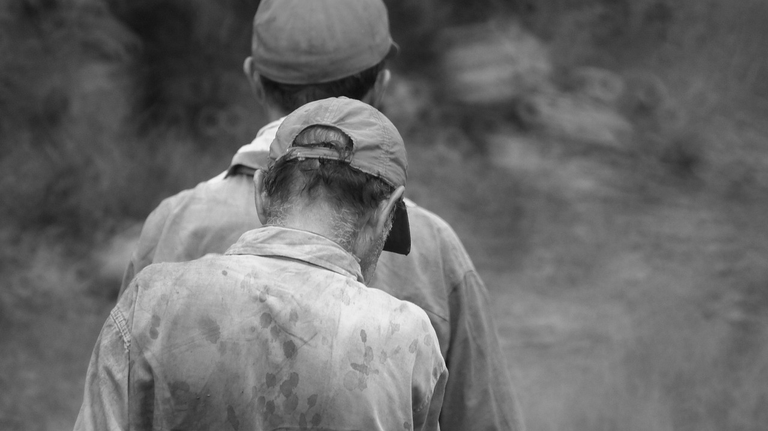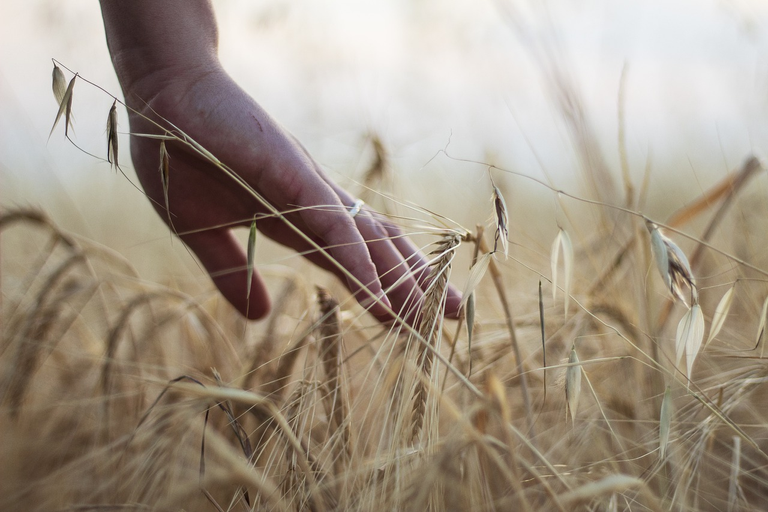
Let that which is still be still

"This is his uncle, my younger brother. His name is Cristóbal," he told us, and as is customary in our country, we asked for his blessing.
"Blessing, uncle," we all said and he only mumbled something between his teeth. His eyes looked like those of a frightened, runaway animal. Dad, sensing his misgivings, and as if treating a small child, assured him by putting his hand on his shoulder:
"Cristobal, these are your nieces. We are your family. This is your home. You can be at ease here".
My father had promised my grandmother and her siblings, when he left his mother's house where he had grown up, that after he found work in the city and had a house of his own, he would help them leave the countryside so that they too could live differently.
First he brought my grandmother, my father's mother, who lived with us. Then he brought his sisters, one by one, and he looked for work for them in the family home, cleaning and cooking, and my aunts were no longer living in our house. She also did the same with her brothers, and my uncle Cristóbal was the one who was missing.

"I used to get up early and start clearing the land to harvest corn and yucca. If you could see how I have hectares of corn, yucca and tomatoes," said my uncle Cristóbal, looking at the infinite as if he could see, right there, his entire harvest.
Dad had tried to find him a job, but as my uncle was introverted and very shy, he only lasted a short time in the jobs, because the bosses said that my uncle didn't understand machines because he was a peasant who had never been in the city.
So Dad decided that while my uncle was getting used to some things, he should help him with the housework. So my uncle started to pick us up from school, which was near the house; he also cut the bushes, washed the car and so on.
When my uncle would go to pick us up from school and we would come back, a group of boys would always shout at him from one of the corners:
"You peasant, you old donkey!" -they said and laughed. We watched my uncle, a young man in his 20s, lower his head and walk on. He never stopped, never said anything.
Other times, they would shout at him:
"You don't speak because you have no teeth. You're an Indian and you're missing your guayuco".

What came next no one would have imagined. Or suddenly they did, because there is a saying that the pitcher goes to the river until it breaks. So one day, on our way home from school, a boy added fuel to the fire:
"Fo. It smells like cow dung" - and then he spat near my uncle's feet. At that moment I saw my uncle let go of my hand and grabbed the boy with both hands and lifted him onto his shoulders. We all screamed because we understood my uncle's intention: to smash him to the asphalt. But my uncle realised that we were afraid and put the boy back on the ground. Then he took us by the hands and we went home.
After that, my uncle didn't take us to school anymore and after a few months he went back to the countryside. I remember that when he said goodbye to us, he said it with a smile. He looked so happy to be back, and now that I think about it, maybe that earthy smell was because uncle Cristóbal was a tree, a tree that had been uprooted from its land and that silently longed for its roots. A tree that was drying up in the city.


Thank you for reading and commenting. Until a future reading, friends

The main image is free to use and edited in Canva, and the text was translated with Deepl Translate.
Click here to read in spanish
Deja quieto lo que está quieto
Lo recuerdo claramente cuando llegó: su ropa era vieja, descolorida, y de su piel brotaba un olor a tierra; también era muy callado y tenía una mirada esquiva. Llevaba una bolsa plástica entre sus manos donde llevaba un pantalón, una camisa y un cepillo de dientes: ese era su único equipaje. Mi padre lo presentó:
_Este es su tío, mi hermano menor. Se llama Cristóbal – nos dijo y como se acostumbra en nuestro país, le pedimos la bendición.
_Bendición, tío –dijimos todas y él solo murmuró algo entre dientes. Sus ojos parecían al de un animalito asustado y huidizo. Papá, intuyó su recelo y como si tratara a un niño pequeño, le aseguró poniéndole la mano en el hombro:
_Cristóbal, estas son tus sobrinas. Somos tu familia. Esta es tu casa. Aquí puedes estar tranquilo.
Mi papá le había prometido a mi abuela y a sus hermanos, cuando se fue de la casa materna, donde se había criado, que luego que encontrara trabajo en la ciudad y tuviera casa propia, los ayudaría a salir del campo para que ellos también pudieran vivir de manera diferente.
Primero se había traído a mi abuela, la mamá de mi papá, la cual vivía con nosotros. Luego se trajo a sus hermanas, una a una, y fue buscándole trabajo en casa de familia, limpiando y cocinando, y ya mis tías no vivían en nuestra casa. También hizo lo mismo con los hermanos varones y mi tío Cristóbal era el que faltaba.
Por ser el más pequeño de sus hermanos, papá trataba a mi tío Cristóbal como si fuera un hijo. Le decía que lo ayudara en todo: a arreglar el techo, a cambiar los cables de la electricidad, a empujar el carro. Mi tío Cristóbal, acostumbrado a las faenas del campo, era muy fuerte. Era tan fuerte como callado. Apenas hablaba con mi papá y cuando hablaba era recordando el campo:
_Yo allá me levantaba temprano y me ponía a limpiar el terreno para cosechar maíz y yuca. Si vieras cómo tengo hectáreas de matas de maíz, yuca y tomates –decía mi tío Cristóbal mirando el infinito como si pudiera ver, allí mismo, toda su cosecha.
Papá había intentado buscarle trabajo, pero como mi tío eran introvertido y muy tímido, solo duraba poco en los trabajos, porque los jefes decían que mi tío no entendía de máquinas porque era un campesino que nunca había estado en la ciudad.
Entonces papá decidió, que mientras mi tío se acostumbraba a algunas cosas, lo ayudara en los trabajos de la casa. Fue así que mi tío comenzó a buscarnos al colegio, que quedaba cerca de la casa; también cortaba las matas, lavaba el carro y así hacía cosas muy puntuales.
Cuando mi tío nos iba a buscar al colegio y veníamos de regreso, siempre, un grupo de muchachos que se apostaba en una de las esquinas, le gritaba:
_¡Campesino, burro viejo! –decían y se reían. Nosotras veíamos a mi tío, un joven de unos 20 años, bajar la cabeza y seguir de largo. Jamás se detuvo, ni dijo nada.
Otras veces, le gritaban:
_No hablas porque no tienes dientes. Eres un indio y te falta el guayuco.
Una vez nosotras le dijimos a papá que un grupo de muchachos molestaban al tío y aunque mi tío lo negó, papá fue a hablar con el grupo de muchachos y le prometieron que no se burlarían más de él. Pero fue falso: siguieron con las burlas y ahora eran burlas peores. Aún así, mi tío parecía imperturbable, como si realmente no escuchara lo que le decían. Así estuvieron por muchos meses: burlándose de la procedencia de mi tío y de su aspecto.
Lo que vino después nadie se lo hubiese imaginado. O de repente sí porque hay un dicho que tanto va el cántaro al río hasta que se rompe. Por eso un día, mientras volvíamos del colegio, un muchacho añadió más leña al fuego:
_Fo. Huele a bosta de vaca –y luego escupió cerca de los pies del tío. En ese instante vi cómo mi tío soltaba mi mano y agarraba al muchacho con sus dos manos y lo alzaba sobre los hombros. Todos gritamos porque entendimos la intención de mi tío: estrellarlo contra el asfalto. Pero mi tío se dio cuenta que teníamos miedo y volvió a dejar al mucho en el suelo. Luego nos tomó de las manos y nos fuimos a casa.
Después de eso, mi tío no nos llevó más al colegio y a los meses se volvió al campo. Recuerdo que cuando se despidió de nosotros, lo hizo con una sonrisa. Se veía tan feliz de regresar, que ahora que lo pienso, tal vez aquel olor a tierra era porque tío Cristóbal era un árbol, un árbol que había sido arrancado de su tierra y que en silencio añoraba sus raíces. Un árbol que en la ciudad se estaba secando.
Honestly, not everyone can cope with city life. It is worse for an introvert. An extrovert that leaves the countryside for the city would put in an effort to blend with time not to talk of an introvert. Your uncle returned to his root where the water and nutrients for his survival are easily gotten.
Yes, I think there is a lot of truth in your words. Not everyone can live in a city. Taking people out of their home can sometimes be traumatic. Greetings
👏 Keep Up the good work on Hive ♦️ 👏
❤️ @bhattg suggested sagarkothari88 to upvote your post ❤️
🙏 Don't forget to Support Back 🙏
Thanks for your support, friends
@nancybriti1, you are most welcome!
Please Support Back
Here is !ALIVE token gift for you
@nancybriti1! You Are Alive so I just staked 0.1 $ALIVE to your account on behalf of @ hivecurators. (3/10)
The tip has been paid for by the We Are Alive Tribe through the earnings on @alive.chat, feel free to swing by our daily chat any time you want, plus you can win Hive Power (2x 50 HP) and Alive Power (2x 500 AP) delegations (4 weeks), and Ecency Points (4x 50 EP), in our chat every day.

Nice story.
I guess he was just missing home and wasn't used to city life. Maybe that's the reason your uncle was quiet and barely talked. With the way he lifted the bully I'm sure they'll be scared of him now.
Exactly. My uncle never got used to city life. In fact, the noise of the cars intimidated him. Greetings
Those are some powerful memories, @nancybriti1. It is amazing that your uncle put up with the taunting so well, for so long! It does sound like he truly belonged in the countryside! Thank you for sharing your story in The Ink Well, and for reading and commenting on the work of other community members.
Thank you for these initiatives and for your words of encouragement. Best regards and continued success.
What a beautiful and crafted story. Truly, your uncle wanted to be back to the countryside. I love how you described your uncle as a tree who needed its root to grow well and steady. He couldn't find that in the city.
In fact, my father was never able to take it out of his field again. He said that his thing was the land, the trees, the animals. Thank you for your comment
In truth, there are people who do not feel happy in other places, they have very strong roots to the place of their origin and removing them from their home is like uprooting the tree from its roots.
Thanks for sharing your experience with us.
Happy day.
So it is. Happy day to you too
This is an amazing write up. Bullying is very bad, your uncle back was a good decision
I agree with your words. Thank you for commenting
I wonder why kids will be so disrespectful to the point of not respecting someone older than them, at least he was able to scare them.
That guy was lucky your Uncle cared about you guys, otherwise he would have been a goner. I will never understand bullies but my prayer for them is to always meet who will pay them back in their coin.